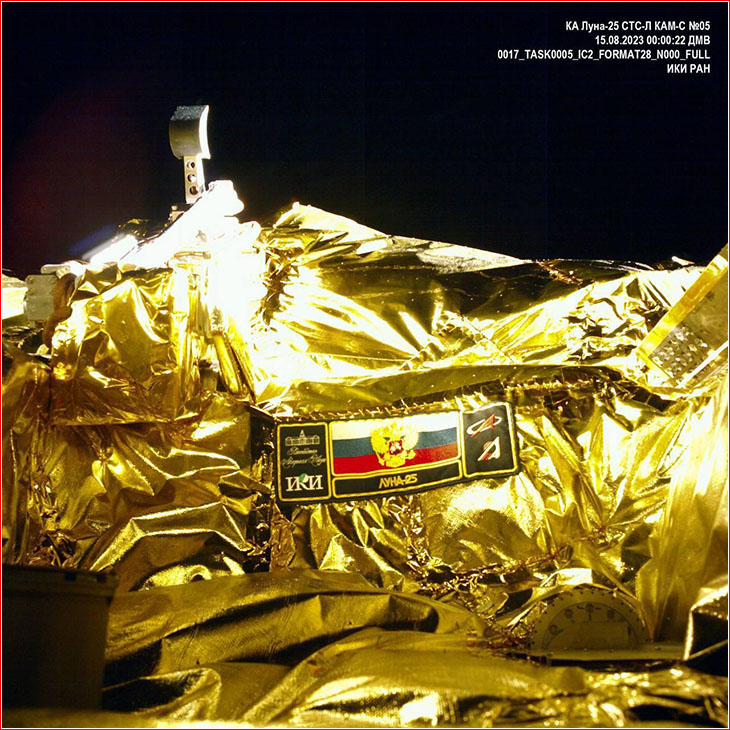Sunday 8:15 am ET update: Russian space officials have confirmed the loss of the Luna 25 spacecraft on the Telegram social media network. The failure occurred during a burn of the vehicle's propulsion system to move it into a "pre-landing" orbit on Saturday morning. However, due to an unspecified problem the propulsion system instead sent the vehicle crashing into the lunar surface.
This is a stunning loss for the Russian space program given that it is the country's first attempt to return to the Moon since a 1976 robotic mission by the Soviet Union. Roscosmos, the Russian space corporation, said an "interdepartmental commission" will be formed to study the mishap.
Original post: In a terse update posted on the social media network Telegram Saturday, the Russian space corporation Roscosmos said that an "emergency situation" had occurred on board its Luna 25 spacecraft.
The 1.2-ton lunar lander entered orbit around the Moon three days ago, and since that time Russian engineers have been sending commands for small engine burns to correct the spacecraft's orbit. Roscosmos sent another of these commands on Saturday to put Luna 25 into a "pre-landing orbit," ahead of a landing that had been due to occur as soon as Monday.
However, during the maneuver at 14:10 Moscow time (11:10 UTC) on Saturday a problem occurred, which did not allow the operation to be carried out successfully. "The management team is currently analyzing the situation," concluded the short statement from Roscosmos.
Since that time rumors have been running rampant on Russian social media channels, with the presumption that the spacecraft has probably been lost. Russian space reporter Anatoly Zak said it seems possible that Roscosmos has lost communication with Luna 25, but will continue its efforts to try to contact the spacecraft.
Russia's efforts to reestablish communication with Luna 25 will be complicated by the country's lack of a deep space communications network. Satellite tracker Scott Tilley noted that the country's ability to communicate with Luna 25 will be limited to when the Moon is visible over Russia. There are relatively few of these opportunities in the days ahead.
A major setback
The loss of Luna 25—should efforts to restore communications with the spacecraft be unsuccessful—would represent a significant blow to the already reeling Russian space industry. The mission lifted off nine days ago as part of an effort to rekindle the historic space exploration efforts undertaken by the Soviet Union in the 1960s and 1970s. Essentially, the modest Moon mission was supposed make Russia great in space again.
As Ars has previously reported, the collapse of the Soviet Union in 1991 sent Russia's economy into a tailspin. Meager funding for the Russian space program went toward maintaining the Mir space station in low-Earth orbit and joining NASA to build the International Space Station, primarily with hardware and spare parts from Mir's development. The country has continued launching humans on Soyuz spacecraft, technology which dates back more than half a century.
The final Soviet lunar mission launched in 1976. In terms of interplanetary exploration, the Russians launched two shots at Mars in 1996 and 2011, but both failed to leave low-Earth orbit. Several European Mars missions have successfully launched on Russian rockets, but those relied on European technology to reach the red planet and operate there. Since the dissolution of the Soviet Union, Russia has not successfully sent a probe to the Moon.
Russia has said it does not want to stop with Luna 25. There are plans for a Luna 26 orbiter mission, officially projected to launch in 2027, followed by two more ambitious robotic landing expeditions. But those launches are still years away, and given how long it took for Russia to ready Luna 25 for flight, it's probably a safe bet future Luna missions will be delayed more, if they fly at all.
Now, the questions and concerns about these future missions will be magnified.



3175x175(CURRENT).thumb.jpg.b05acc060982b36f5891ba728e6d953c.jpg)

Recommended Comments
There are no comments to display.
Join the conversation
You can post now and register later. If you have an account, sign in now to post with your account.
Note: Your post will require moderator approval before it will be visible.